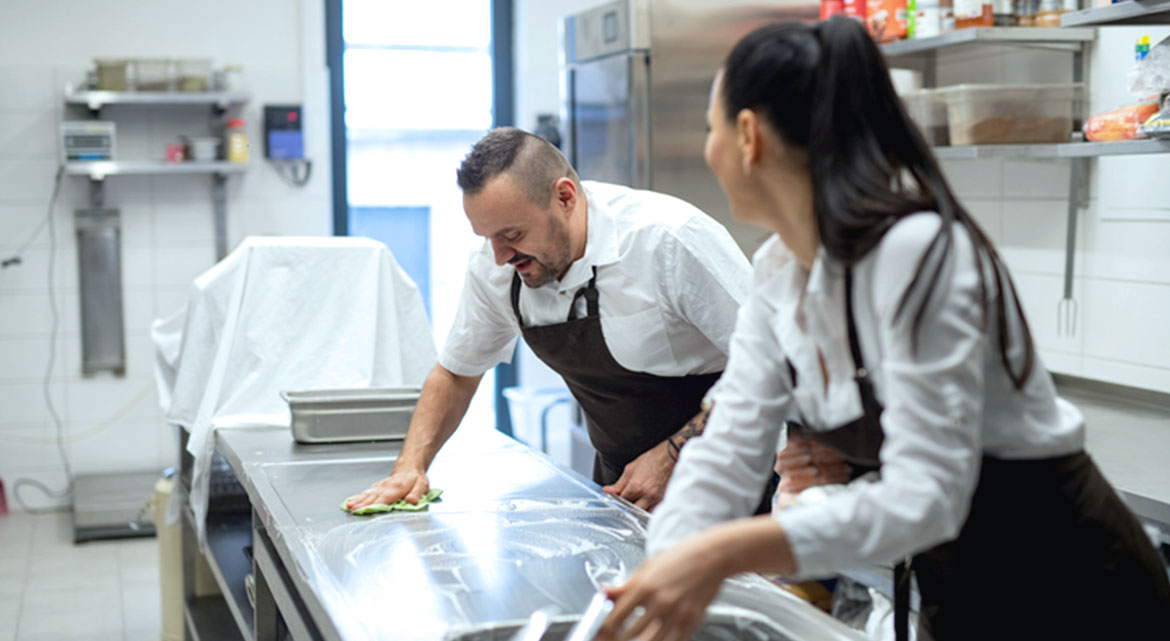Want To Cook More At Home This Year? Here’s How To Keep Your Resolution.
If it seems like everything always tastes better at your favorite eatery, you’re probably right — but never fear. This can be the year you start turning out five-star meals from your own home kitchen. We talked to chefs about the easiest, quickest and smartest ways to up your cooking game, and here’s what they told us.
1. Do big things with humble ingredients
Chef and cookbook author Robin Asbell told HuffPost, “There are a few easy steps that will make every dish taste better. First is to take the time to cook your onions. I get a little twitch in my eye whenever I see a recipe claim that onions can be caramelized in five minutes. Please, take all the time you need, as you do other things, to put those alliums over low heat and slowly coax real sweetness and depth out of them. You can even make a big batch of onions on the weekend as a meal prep.”
Other ingredients that pack an outsize punch? “Go ahead and buy the fresh herbs,” she said. “I know it’s easier to use dried, but nothing is quite as flavorful as a braise with fresh rosemary or a pasta with fresh thyme or basil. People will think you are a professional-level chef just because of the herbs, I promise.”
She also touted the bright flavor that just a quick touch of citrus can bring to any dish, whether sweet or savory. “Take advantage of the fresh flavors of citrus in all your cooking, and use the zest, too,” she said. “Make your own super-simple vinaigrette with olive oil and lemon, lime or orange juice, then toss the zest in pasta or your next baking project.”
2. Viva la trash
Sandy Davis, a chef for Roxo Events, has a simple mantra for home cooks who want to be more like professional chefs: “Don’t throw that away.”
“Folks need to learn to utilize leftovers better and more often,” he told HuffPost. “Things that you might think of as garbage — peels, stale bread and past-prime produce, for example — often are not garbage at all, and they can be made into a myriad of delicious things with the tiniest amount of forethought.”
“I wish home cooks would learn the magic of using vegetable trash to make stock,” Chef Rossi, owner and executive chef of The Raging Skillet, told HuffPost. “I’m embarrassed to say that in the early years of my cooking career, I threw out a boatload of vegetable trimmings. Thank God, as I grew up in my personal life and professional chef life, I learned two things: Don’t date evil women and don’t throw out onion peels.”

Glasshouse Images via Getty Images
If just the word “stock” intimidates you, Rossi said, there’s no need to panic.
“You don’t have to be a rocket scientist. Just save vegetable trimmings in a bag or jar and keep it in the freezer. When you’re ready to cook, drop them in a pot, cover with water and simmer for 90 minutes. When the stock has cooled off, drain it and store it in pint containers in your freezer. Now, every time you’re about to make soup, stew, rice, lentils, grains, curry or a kazillion other things, you have your secret weapon ready to go.”
3. Talk to your butcher
Professional chefs often develop close relationships with the people who supply food for their restaurants. Yia Vang, owner and chef of Union Hmong Kitchen in Minneapolis, said the easiest way for a home cook to do that begins at the butcher shop. “If you eat meat, even just occasionally, start making regular visits to your local butcher shop and get to know your butcher,” he told HuffPost. Bonus: The butcher will likely be happy to offer prep and cooking tips.
4. Simplify, simplify
Cooking at home doesn’t have to be hard, not if you change your cooking mindset to that of many pros, who often put out amazing meals from tiny kitchens with just a few well-chosen ingredients.
At PinKU, a Japanese street food restaurant in Minneapolis, chef John Sugimura says his motto is “simplify and edit.”
“It’s also sometimes changed to ‘lighten up, bitches,’” he admitted to HuffPost.
“Keeping cooking simple is generally more fun,” he said. “Especially when I’m at home, I want to use my time and money to cook for enjoyment, and the way to do that is to avoid overly complicated recipes and forget about perfection.”
Following his philosophy means you can still turn out delicious meals while enjoying a peaceful, harmonious kitchen and, um, lightening up.
5. Call on the mighty power of sauces and reductions
What’s the difference between your sad-looking plain chicken breast and the kind of complex, delicious entrée you order at your favorite restaurant? Often, it’s what finishes the dish. Asbell urges home cooks to build a repertoire of simple sauces that add a “wow” factor. No, you don’t have to slave over a bechamel all day. Instead, use easier — but still jazzy — options like gremolata.
“It’s a simple mince of parsley, lemon zest and garlic, and you can slather it anywhere,” Asbell said. Another professional-level finish is a reduction. That’s just a fancy way of saying: Cook the heck out of a liquid until it seems, well, saucy. “Taking five minutes to cook down wine, stock, juice or other liquid will give you a super-tasty sauce,” Asbell said.

BRETT STEVENS via Getty Images
6. Make a commitment to home cooking
If you really want to cook better meals at home, you need to actually do more cooking to help you get there. Vang suggests setting a goal of making at least two home-cooked meals a week. “I mean really home-cooked, not just taking things out of a package and using ‘Chef Mike,’ which is what us cooks call the microwave,” he said.
Another great way to up your chef skills is to start cooking food for other people. Vang suggested sharing the home-cooked love as part of a new routine— safely, of course. “Twice a month, invite someone over for dinner,” he said. “It doesn’t have to be a fancy party, just a meal with someone who doesn’t eat your food all the time.”
7. Make friends with your freezer
How can you ensure you always have ready access to top-quality stocks, meats, veggies and other ingredients? Professional chefs understand the power of using the freezer for something besides ― and we mean no offense here ― vodka and ice cream. “I’m amazed by how many people don’t even consider freezing leftovers to be used later, and that includes culinary students who should know better,” Davis said. “It only takes a bit of creativity, planning and some extra elbow grease.” Soon, like the pros, you’ll be able to pull meals together faster — and better — because you’ll have so many of the ingredients already prepped and chilling, just waiting for your finishing touches.
Belén Rodriguez, founder and CEO of Quebracho Empanadas, is another member of the Full Freezer Club. “My husband Rob and I have a stand-up freezer in our basement, and we always stock up on better-for-you frozen meals, as well as other essentials like homemade chicken broth, dough for quiche or pre-portioned cuts of meat,” she said. “It’s a great way to reduce food waste, keep up with our busy lifestyle, and ensure we eat nutritiously, as opposed to finding last-minute foods that are either too fried, too processed and that don’t really taste all that great.”
8. Need a sous chef? Enlist your kids
Professional chefs have all sorts of kitchen help, so why not you? Put your kids to work doing simple things like tearing up greens, stirring batter or mashing vegetables, and you’ll have more time to put the perfect finishing touches on your creations. You might be doing them some good, too.
“In our hectic society, family meals encourage connection and help your children reach their full potential to lead happy, healthy lives,” chef Marshall O’Brien told HuffPost. And if you manage it right, they’ll be a free source of sous chef labor until they leave for college. O’Brien cited research that getting your kids involved in mealtime can help with things like building vocabulary, communicating effectively and interacting in socially appropriate ways.








